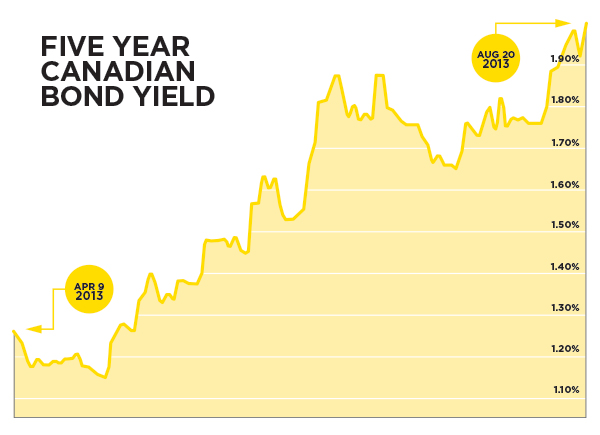
Aug. 29, 2013 | CREBNow
Banks Raise Rates
As Canada's major banks make moves to increase mortgage rates, real estate experts are saying pre-approvals are the way to go for consumers.On Aug. 20, the Bank of Montreal announced it was increasing the interest on most new mortgages by 20 basis points, a move soon echoed by TD, RBC and other banks. When it comes to Calgarians looking to purchase a home, Sherry Jenkins with Mortgage Intelligence said preapprovals are an important part of the mortgage process.
"I think a pre-approval's really important if you're thinking about purchasing because rates are on the move," she said. "You can increase your rate hold after that. It kind of protects you, especially in an increasing rate market."
Banks previously made a push for increasing fixed mortgage rates in June. A move at the time real estate investor and founding partner of the Real Estate Investment Network Don R. Campbell said was in response to Federal Finance Minister Jim Flaherty "admonishing them for having such low rates and thus potentially inflating the real estate markets in key cities."
"The banks moved the posted rates up, however at the same time, they increased the available discounts that savvy consumers could get if they asked," he said.
Campbell said depending on the financial institution, bank managers receive a daily or weekly spreadsheet outlining available posted rate discounts their branch can offer to clients.
"That means one week, the bank may be offering deep discounts on seven year mortgages and not as much on three year," he said. "Then the following week this could reverse. So it's important for consumers and homebuyers to ensure they are asking for the different discounts (and) looking at all their options before just blindly signing for the typical three or five year mortgage."
Last June, Flaherty announced new rules governing mortgage lending and borrowing, including reducing maximum amortization from 30 to 25 years and limiting the amount Canadians could borrow when refinancing their homes from 85 to 80 per cent of the value of the home.
"Our government stands behind the efforts of hard-working Canadian families to save by investing in their homes and their future," he said of the 2012 announcement. "The adjustments we are making today will help them realize their goals, build in the previous measures we have introduced to keep the housing market strong, and help to ensure households do not become overextended."
In breaking down what the changes could mean for current mortgage holders or people looking to purchase a home, Rob McLister with Canadian Mortgage Trends said a jump of 20 basis points means a household at the edge of affordability would need $1,100 more income to get a variable-rate mortgage on a $300,000 house with five per cent down.
Since May 1 of this year, McLister said a five-year mortgage payment on that same $300,000 home has increased about $120 a month, a payment change he calls a "potential source of financial difficulty for less than one in 10 mortgage holders".
"Naturally all these incremental rate hikes can add up and decelerate home sales," he added. "But based on past consumer surveys, it could take a good point and half rate-bump to curtail buying decisions in meaningful ways. At the moment, we're only halfway there."

While rates are increasing, Campbell pointed out the numbers are still at historical lows.
"The Bank of Canada has signaled that they don't intend on pushing up their prime rate until 2014 — and even then a slow rise — so variable still is an option for many homebuyers. If they take the variable option, they should make payments at the equivalent of the locked in rate, so they are preparing themselves for inevitable prime rate increase next year."
Preparing themselves for that inevitable rate increase next year, Benjamin Tal, deputy chief economist, CIBC World Markets thinks this is the end of low interest rates in Canada.
"I think this is the real thing...this is the end of extremely low interest rates. They're simply unsustainable... This is the beginning of a test for the mortgage market, it's a test of how Canadians are able to tolerate higher interest rates."
Tagged: Calgary Real Estate | Calgary Real Estate News | Canada Real Estate | Homebuyers | Homeowners | Interest Rates | Mortgages




